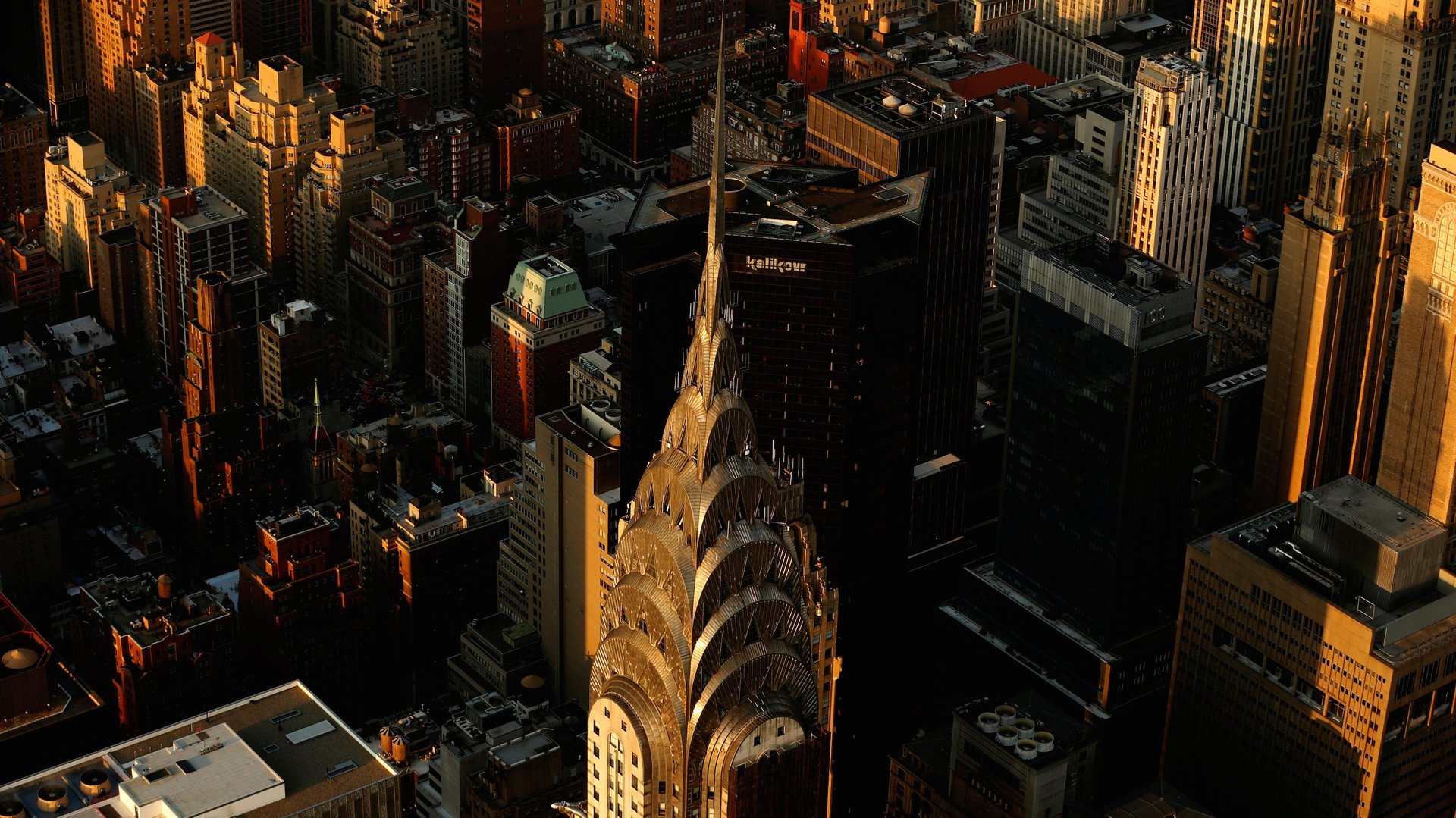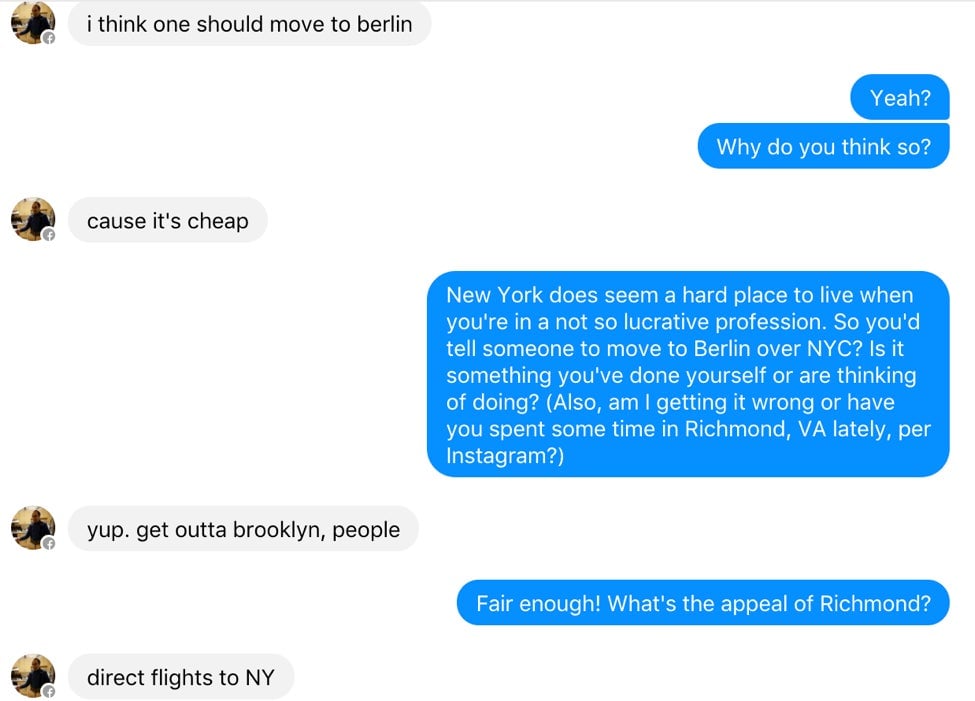Do you have to live in NYC to make it as a writer? Advice from three renowned authors
A few weeks ago, I was visiting New York City, standing in the top floor of The Whitney, staring at the museum’s giant burning candle of Julian Schnabel, when God spoke to me. His voice was deep. His accent was foreign but hard to place.


A few weeks ago, I was visiting New York City, standing in the top floor of The Whitney, staring at the museum’s giant burning candle of Julian Schnabel, when God spoke to me. His voice was deep. His accent was foreign but hard to place.
“You should move here,” he said.
I turned around to face him. In a red fedora, with an overcoat draped over his shoulders, he was unmistakable. “You think so?”
He squinted at me for a couple of seconds. “Yes, I do.”
It’s possible that God just hangs around The Whitney all the time, saying this sort of thing to earnest-looking girls like me. But maybe he really was reading my mind. It wouldn’t be too hard—I’ve been pondering the question of where to live for years now.
If you hope to make it as a writer, do you have to move to New York—or any particular “cultural capital,” from Paris to London to Melbourne? I want to believe the answer is no. After all, art happens everywhere. And the digital age has rendered the idea that you need to be physically present to meet editors or submit your work obsolete. But speaking for myself, I’ve wondered if living in Richmond, Virginia means I’m missing out on something crucial.
Grasping for clarity, I decided to email three well-known writers to get their perspectives. Tim Kreider, the essayist and author of We Learn Nothing, came back with a diatribe so funny, comprehensive and on point I’ve got no choice but to block-quote the whole thing. This is what he said about living in New York.
My own career path was so meandering and implausible I’d be reluctant to apply it as a model for anyone else. That said:
There would seem to be no good reason in the 21st century why you’d need to be physically in one place rather than another to be a writer. And from any practical standpoint it’s the stupidest place on Earth to live if you’re going into a notoriously un-lucrative profession. Nevertheless it feels like it’s been an advantage to be here and have martinis at the Old Town with my New York Times editor, have the occasional lunch with editors or publishers, and eat steak and get hammered on wine with my agent.
But I think there are a lot of other, non-utilitarian reasons why writers and other artists come to this city. To some extent, it’s performative; you’re publicly demonstrating your ambition by moving here, the same way more conventional people demonstrate their adulthood by getting married, buying a house, or some other suburban ordeal ritual. This skyline you’ve seen in so many movies and TV shows serves as a backdrop for your life, reminding you that, no matter how miserable and impoverished you are, at least you’re not back in [your hometown here] with those fucks you went to high school with. Also, a lot of artists tend to be depressives, who require the constant high stimulus of this place.
All that said, it’s clearly a horrible place to be an artist, and has never been more actively hostile to them, more arrogantly overpriced. I’ve been here too long at this point—going on 17 years—and at nearly 50 I find the constant hateful noise, the ugliness of the place, the crowds mashed ass-to-ass on the subway, the summer stink, all intolerable. If I didn’t have a job and friends and a girlfriend here, all of whom I love, I’d leave today and miss nothing about it but Film Forum and Grand Sichuan.
In essence, Kreider’s opinion of whether it makes sense to live in New York as a writer comes down to a heavily qualified “Yeah, maybe.” That was the closest I came to a rousing endorsement from anyone. The poet Erin Belieu—who lives in Florida and whose poem, “When at a Certain Party in NYC,” may be the best thing ever written about feeling like a yokel in New York—was emphatic in saying that you don’t have to make the move at all.
“New York is wonderful—one of my favorite cities in the world—but it is up its own bum a good deal of the time,” she said. “And maybe that’s fair. It’s so exciting and dynamic and stylish in many ways. But art requires various perspectives. So, you know, great if you want to be at the center of it all. That would never suit me. I like a much lonelier place to do my thinking and feeling. Otherwise I end up feeling like I have bees in my brain.”
Gary Shteyngart, who lives in Manhattan and whose acclaimed 2010 novel Super Sad True Love Story takes place in a dystopian but instantly recognizable New York, recommends that writers head abroad for the cheap life.

I asked Shteyngart about Richmond not just because of his Instagram but because, as we were having this exchange on Facebook Messenger, I was in Richmond myself. After a stint abroad, my husband and I moved there in 2015, in part because it’s affordable and has a convenient airport. It’s not, however, what you’d call a cultural capital. I used to fall asleep at night muttering to myself like Arya Stark, except I wasn’t reciting the names of people I was planning to kill. Instead, it was Flaubert’s advice to “Be regular and orderly in your life like a bourgeois, so that you may be violent and original in your work.” I pitched ideas to editors in New York constantly. But I couldn’t even get rejected—I never received responses.
Then I popped off a quick story about our crazy-low mortgage for a personal-finance site called The Billfold. That night, I got an email from a senior editor at one of my favorite magazines in the world. In, yes, New York. “Saw your thing,” she’d written. “Pitch me.” (Shea Serrano, a staff writer at The Ringer, has a similar, only far more spectacular story.)
“See?!” my husband, Chris, crowed. “New York came to you! We don’t have to move there and pay some $4,000-a-month rent.”
“No!” I wailed. “We still have to.”
My desire to live in New York is an irrational compulsion. It’s a hangover from my 20th-century childhood, in which people had to put on pants and show up to actual places for anything to happen. I do have reasons for wanting to live in the city. For one, despite a great deal of proof to the contrary, I am a sucker for the delusion that moving will change me. And it’s easier to move than it is to figure out how to take a leap in your work.
Plus, there’s this crust of earnest politeness that I am trying to slough off. The South, where I grew up, is a factory that churns out female people-pleasers. I know this because I am one. I need to stop being polite all the time, and New York seems a good place to learn to do that. People here can be so rude, which is exhilarating to me. I’m hoping they can teach me by example, like Yoda taught Luke Skywalker.
In the end, I didn’t need help from God, who turned out to be a neighborhood character known as “The Mayor of Meatpacking” that afternoon at The Whitney. I know you don’t have to live in New York to be a writer. The notion is passé to the point of camp. Everything Tim Kreider, Erin Belieu and Gary Shteyngart said is true and wise. You can do good work anywhere.
I hope knowing that helps you. Me, I am beyond help.
I’m finishing this article in a tiny hotel room off Columbus Circle. The process of finding an apartment in New York is just as grueling and terrifyingly expensive as you’ve heard. All I can say is that sometimes you have a fixed idea you just can’t shake, and the only way out is through.